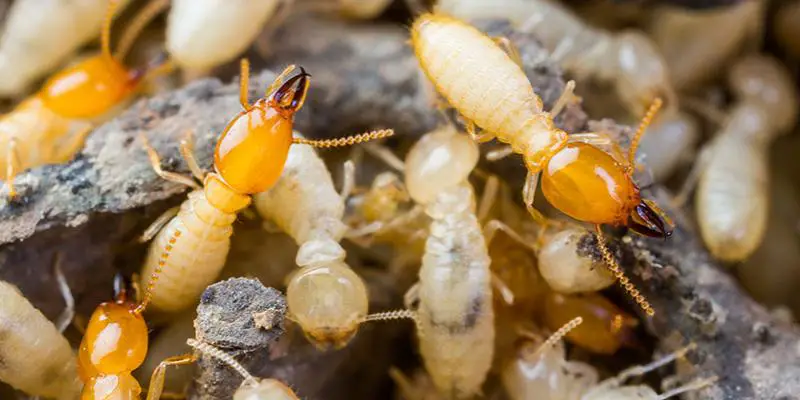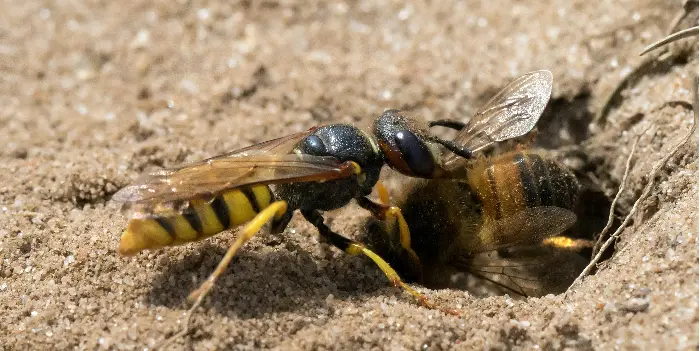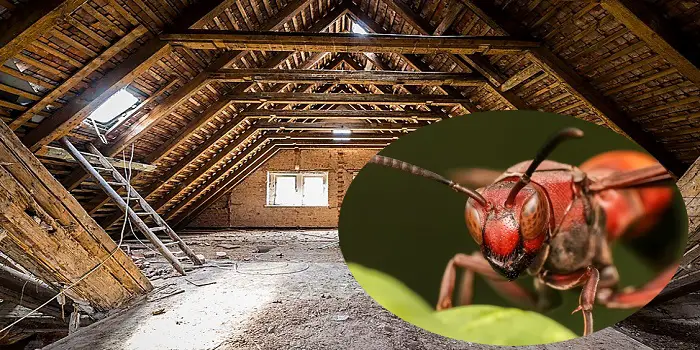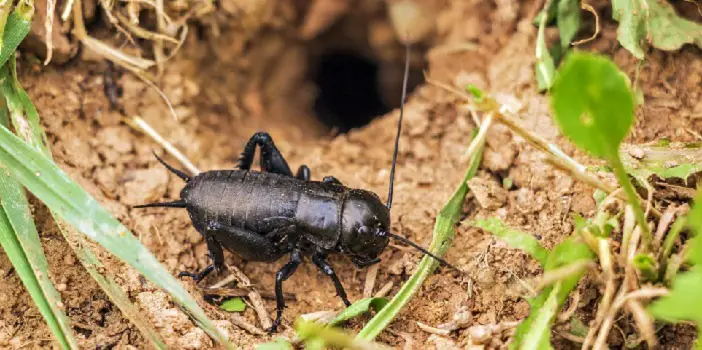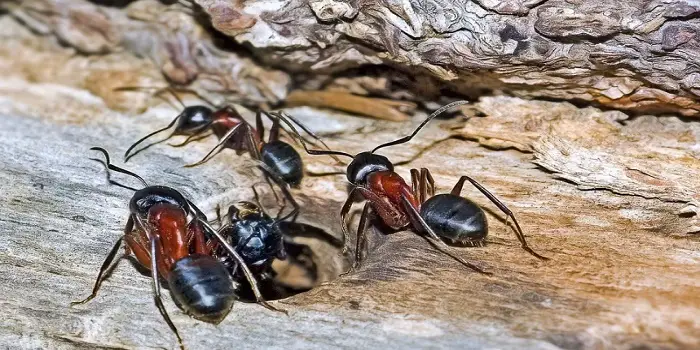
Fire ants are very different from ordinary insects.
What makes them unique is their aggressive nature and red body coloration that may range from reddish-brown to reddish-black.
You can even classify them as the most aggressive insects known to mankind.
They sting really hard on humans and animals, and these stings may often lead to nausea and irritation.
If you have been stung by a fire ant before, you would most probably know what it feels like.
But if you haven’t, then, believe me, you are very lucky as I’ll be offering some remedies to control them here.
But before we come to those, let’s discuss a few more facts about fire ants…
What Are Fire Ants?
The Fire ants are among the most aggressive ant types.
Upon disrupting, these ants will start to swarm and may release a pheromone that can attract more ants to attack.
Fire ants are referred to as stinging ants, and they belong to the genus Solenopsis.
It’s the same family to which stingers like ginger ants, red ants, and tropical fire ants belong.
Are They Dangerous?
Fire ants have the most savage stings, and they are not at all scared to come out and defend their territory if troubled.
Despite the fact that fire ants can be dangerous, they rarely can cause death.
Only about five percent of people who are stung by fire ants felt severe allergies (like swelling up of the throat, suffocation, etc.) which caused them to die.
Their bite will mostly cause a burning sensation like fire (hence the name) which is sometimes followed by raising and reddening of the skin.
The swollen, itchy bump on the skin can become infested if you scratch it for long.
To neutralize or treat fire ant bites naturally, use an ice pack.
After you feel a bit relieved, consider taking an antihistamine and using hydrocortisone cream to reduce the itching.
Where are They Found?
Red fire ants are found worldwide, mainly in subtropical south-eastern USA states.
Some of these US states where fire ants are seen most include Florida, Georgia, South Carolina, Louisiana, Mississippi, and Alabama.
They can also be seen in a few parts of North Carolina, Virginia, Tennessee, Arkansas, Texas, Oklahoma, New Mexico, and California.
Just like the other class of ants, they also build mounds.
And their favorite areas to build mounds are open gardens, fields, parks, and any place which is open and gets direct sunlight.
If humans, any animal, or other insect tries to intrude or break their mounds, they will appear in big numbers and attack till they chase away or kill them.
What Damages Can They Do?
They have big colonies, and their team could be as big as 500,000.
Just think of your garden filled with these many numbers of fire ants!
They are not just ferocious but can also dig up mounds and tunnels in your garden, which makes it a must for you to get rid of them.
For some reason, they like to stay around places with electrical current.
So, these tiny pests can also damage your telephone wires, electrical units as well as crops, and small plants in the vegetable garden.
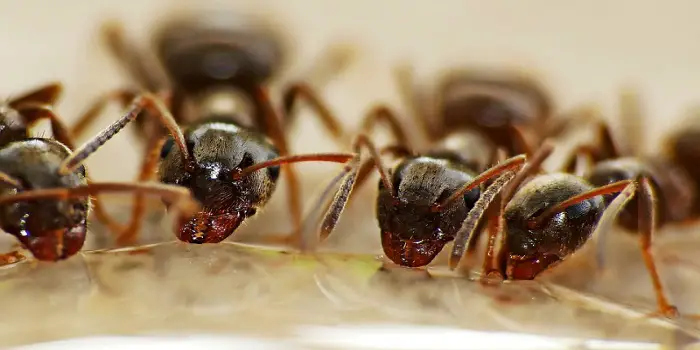
How to Destroy and Get Rid of Fire Ant Colonies?
No matter where fire ants decide to make their residence in your home, you need to make them leave as soon as possible.
Here are some tips and remedies to help you get rid of these perilous ants and their colonies from your home and yard forever:
Step 1. Look out for all their mounds
A fire ant colony is represented by several mounds because of the number of tunnels their workers dig.
If there are fire ants present, you will likely come across a great number of these mounds in your garden.
Some may be obvious while others not, as fire ants build their homes anywhere they like.
Hence you need to do a complete inspection of the area to find them all.
After you have located all of them, take sticks and insert them inside the ground just next to the mounds so that you can come back to them easily.
Fire ants work laboriously and are busy for the most part of the day.
They only return at night to rest. Hence, the best time to attack their mound is at night when they will be resting.
You may not see clearly at night, but the sticks you have already inserted into the ground will serve the purpose and help you in locating their dens conveniently.
Step 2. Use hot water to drown them all
Boil a sufficient amount of water and flood all the fire ant hills you have located.
- Pour the hot water through the entry point as fast as you can and move to the next den.
- Water will flow till the time there are channels for it to pass and make all the ants drown inside.
- Do not forget fire ants are aggressive, and they will attack you if you stay there for long.
The hot temperature of the water will kill these small pests and the water will disrupt their balance to easily drown them.
You can also add liquid soap (or a Dawn dish soap) to enhance the drowning procedure. This will also make sure that the ants don’t swim out.
The best thing about using hot water is it’s completely environmentally friendly and causes no harm to nearby plants or humans.
Step 3. Garlic or Cayenne Pepper with hot water
Though the hot water method works great on its own, if you want to really win over them, you can include some of their most dangerous enemies, like garlic and cayenne pepper.
Fire ants hate cayenne pepper, and some can’t bear the smell of garlic.
Including garlic and cayenne pepper in hot water will kill them significantly, wiping out all the chances of their survival.
- Get lots of garlic cloves and cayenne pepper.
- Grind the cloves in powdery form and put it with pepper in the utensil in which the water is boiling
- Pour the cayenne pepper- garlic- hot water mix in the holes and get away as soon as possible to prevent from getting bitten.
Just follow the same procedure above, making sure you attack at night when most of the fire ants are at their home.
An additional tip here is to pour the mix into a spray bottle after the water has cooled down.
Take a spray bottle and go to the mounds’ locations.
You should also check behind telephone boxes, AC vents, carpets, and other crevices and holes from where they may have crept through.
Just use the spray as soon as you see them and also spray nearby areas to prevent more from coming.
Step 4. Poison the colony
Having your garden intruded by an ant colony of 500,000 workers is surely not a joke.
Hence, sometimes the hot water flush may not be a completely effective solution to eliminating them all.
So, what should you do in such a condition? Poison them!
Fire ants’ poisons are pesticides that may take some time to kill them inside their mounds.
But these are effective in destroying the ant colonies forever.
All you need to do is go to a pest control store near you and ask for it.
There are a number of brands, so make sure you check the label to know what they offer.
Once you have bought the poison, follow these guidelines:
- Look out for the areas in your garden where the fire ants can build their dens. Also, check out the areas where they usually hunt for food.
- Once you have discovered their mounds and foraging spots, buy some sweet chunks of food and spread it all over the area.
- Now spray or apply the toxic insecticide to these food chunks and wait patiently. The fire ant workers will find the food and carry it to their underground holes.
- When the infected food reaches underground to the queen and other workers, it will poison them too. However, the procedure may take a few days to show the results of the poison.
It is important to be cautious when using pesticides and ant poisons like these.
Make sure you keep your pets and kids away from its reach. Right storage is also necessary.
Step 5. Make use of boric acid
Boric acid is also known to kill fire ants very quickly.
You can easily find them at a pest control shop and use them wherever needed.
Just sprinkle the powder all over your garden and the places where fire ants majorly go to forage.
You can also use some bait and put boric acid all over it. As soon as the fire ants consume it, they will die.
Some guidelines for using baits for fire ants are:
- Use the bait only when the weather is sunny, as fire ants are usually active around their dens during this time
- Do not keep bait if the weather is very hot or rainy. The fire ants don’t go out under such weather conditions.
- You can get an ant-bait plate and put the bait in it. It will keep the bait dry and away from the reach of pets and children.
Step 6. Hire an insect extermination service
Depending on the infestation and home condition, it can be your first or last resort.
If you don’t want to take the risk of going near hard-biting, ferocious fire ants, you can simply hire professionals and stay relaxed.
Also, if all your home remedies aren’t effective, then you can call the professionals to eliminate these fire ants, especially if their colonies and numbers are just beyond your management.
Out of all, it is the costliest approach to dealing with fire ants, but you can rely on an expert extermination service to get the task done once and for all!
If the fire ants are just getting started to sweep in, you can, however, choose to go with DIY methods for eliminating them in your home.
Maybe they will understand that they are not welcomed and will leave your place forever.
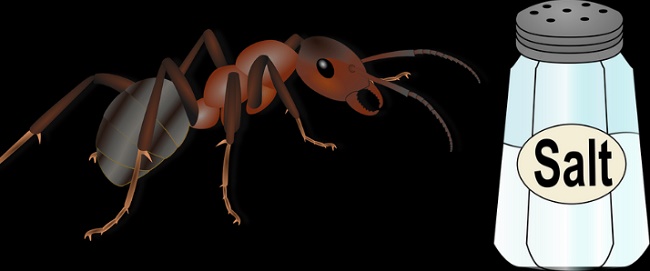
Does Epsom Salt Kill Fire Ants?
Yes, Epsom salt can kill ants and other pests by making them feel dehydrated and disrupting their exoskeleton, which allows them to breathe.
However, to make this desiccant work for you, you must know how to use it correctly.
People trying to keep the ants away from their garden often just sprinkle a line of Epsom salt crystals along the border or in a grid between the plants.
This may sometimes work as an effective ant deterrent but not always.
A sure-fire way to use Epsom salt against fire ants is by:
- Diluting the salt in hot water to make a water solution.
- Allow it to cool, and then, using a sprayer bottle, spray this solution directly onto the ants.
It’s a bit boring to hit every ant you see individually using this homemade fire ant killer spray.
So, this works best (and is the recommended option) if you have a large infestation or a never-ending mound of fire ants.
Keep in mind that if you are using Epsom salt (magnesium sulfate) to prevent ant hills in your garden, it can pose a few problems if used incorrectly.
When sprinkled in your backyard garden, it generally breaks down into magnesium, sulfur, and oxygen.
It’s beneficial if your soil is deficient. But it can be hurtful to your plants if used excessively or if your soil doesn’t need these elements.
Other Related Questions:
Why are fire ants so hard to kill?
Fire ants usually hide by entering their nest via tunnels.
These tunnels can be several feet long, and hitting a visible mound is not always successful in killing the active ant colonies.
If you find it hard to kill these ants using the above methods, household products like vinegar, apple cider vinegar, Windex, or WD-40 spray can be tried.
Although I haven’t tried these products to deter ants, some of these may work for you.
What plants can repel ants naturally?
If you plan to deter ants in your vegetable garden, growing a few additional ant repellent plants/herbs can work for you.
The most common organic repellent plants that help deter ants include:
- Lavender
- Catnip
- Peppermint
- Rosemary
- Mint
- Thyme
- Tansy
What are other ants in the world most dangerous?
Among thousands of ant species around the world, the world’s most dangerous ones are those that can kill using their powerful jaws and venom-laden stings.
Besides fire ants, the most dangerous ants include:
- Bulldog Ant
- Siafu Ant
- Pony Ant
- Safari Ant
- Bullet Ant
If you suspect any of them to be present around your property, be extra cautious.
The Conclusion
Fire ants are aggressive. They can be dangerous and damaging too.
All you need to do to deal with them is look out for an ant colony and apply the methods that suit you best.
Hot water works effectively against fire ants. However to destroy their colonies permanently you may need to use poison so that there is no possibility of their return.
Share the post "How to Destroy and Get Rid of Fire Ant Colonies Forever?"

Welcome to ProShieldPest.com. I am Tina Jones. I have been working as a pest removal professional in Winslow, Arizona lately. At present, I love to spend my time with my family as a retiree.
Here I share all my knowledge and experiences to help people understand better how they can stop pests at their homes without actually killing them. Hopefully, the information you will find here will help in safeguarding your home! You can check more about me here.

